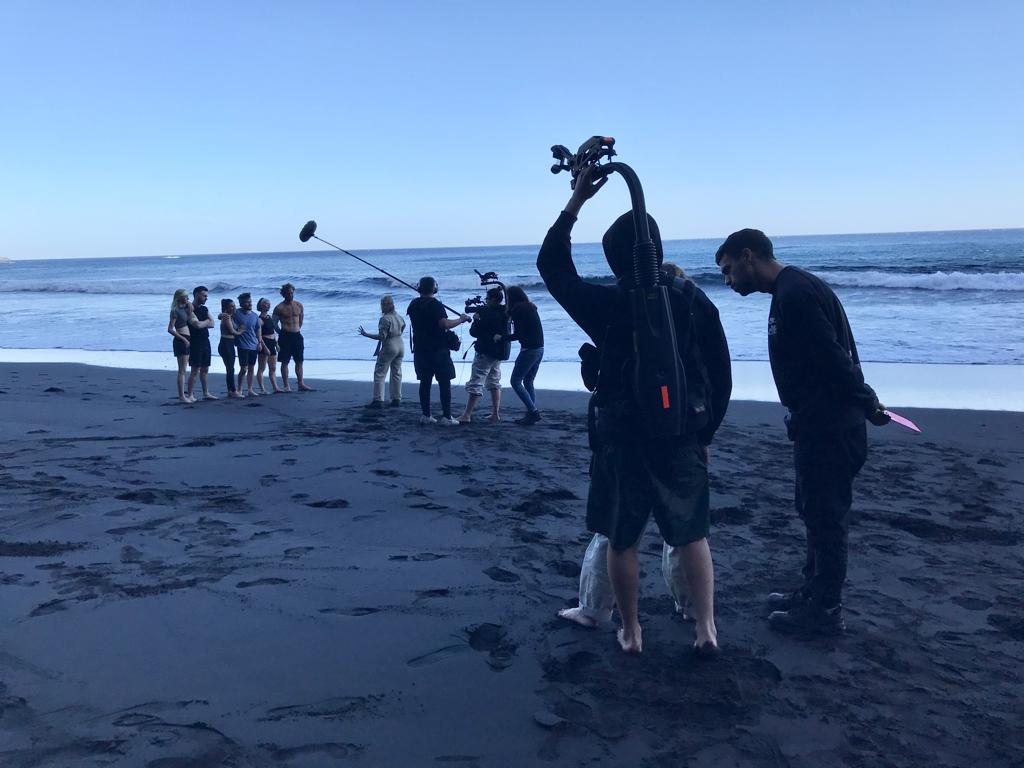The La Palma Film Commission, a project managed by the public company SODEPAL, has recorded an economic impact that adds to the upward trend of the rest of the islands of the Canary Archipelago, an international benchmark as a filming destination. With 135 project applications received by the office, of which 23 projects were finally filmed, they left an estimated direct economic impact of 3.5 million euros, without taking into account the multiplying effect of the indirect and induced economic impact of audiovisual activity on the island. Although the exact figures for some projects have yet to be confirmed, the approximate figures, if counted downwards, suggest that 2023 will be a record year.
This figure is the result of the data that the insular Film Commission office has had access to through the audiovisual production companies that have made use of the assistance and services of this department, so the real repercussion of the economic generation of audiovisual activity on La Palma is even greater, adding the projects that come to the island independently. Although these are smaller, in general terms they multiply the figures available.
A total of 135 projects in development or pre-production phase were attended by the La Palma Film Commission office in relation to general information, location proposals and filming permit management, of which 23 projects were finally shot in La Palma. The rest of the projects correspond to feature films, series and commercials that have not been counted because they will be shot this year 2024, others that have been postponed, others that have been postponed, others that have been taken to other alternative territories, and others that have been cancelled.
In relation to the projects attended to, a total of 95 filming permits were managed, including the management of permits from the Environment and town councils, or information for applications to the Coast, Canary Islands Ports, the Directorate General for Traffic, the National Park of La Caldera de Taburiente or the Canary Islands Astrophysics Institute (IAC). By type of filming, there was one international series, one feature-length documentary, eleven television programmes, three documentaries, one documentary series, as well as advertising projects and short films.
Although the total number of days of filming has decreased with respect to the previous year, with 75 days, there has been an interesting increase in the hiring of 183 professionals, with a direct hiring of 73 professionals from La Palma as technical and creative audiovisual personnel for the different projects, without counting the many extras hired as extras. In terms of country of origin, more than half of the productions are Spanish, and the rest of the productions are distributed among Germany, France, the United Kingdom, Portugal and Norway.
The president of the Cabildo de La Palma, Sergio Rodríguez, stresses that the island still has a long way to go and a lot of potential to develop in order to make the audiovisual sector strategic. The Cabildo de La Palma is committed to supporting the diversification of the economy through a sector that has proven to be successful, but which until now has not received the recognition it requires.
In addition, Sergio Rodríguez points out that the audiovisual sector "is a tool for diversifying the economy of the island and an opportunity for professionals, companies and young people from the island, whose talent finds a promising future in this sector on their own island, thus preventing a brain drain". He also adds that "for the first time, the Island Council has made a firm commitment to a sector which, despite the evidence, has not received the necessary strategic investment, something that we are going to change during this legislature".
For her part, Sodepal's CEO, Miriam Perestelo, confirms that "the data are clear. The evolution analyses support the policies in support of the audiovisual sector. It is an economic activity that brings dynamism due to its multiplying effect, with a generation of direct, indirect and induced impacts of great value on an island that already has experienced professionals and companies, who are currently working in the rest of the archipelago and who have much to contribute to La Palma with their activity".
Miriam Perestelo also stresses that "La Palma has demonstrated its capacity to host any type of filming, from modest advertising campaigns to feature film shoots or international series lasting several weeks, which shows the island's competitiveness as a setting on a par with any destination in the world positioned in the sector".
For her part, Raquel Rebollo, Councillor for Tourism of the island corporation, says that "from this Department we are firmly committed to the audiovisual sector with a historic budget of more than double that which has ever been available for the support and promotion of filming, reaching 260,000 euros". He also adds that "its economic impact is significant, as is the attractiveness of Screen Tourism, which is based on travel motivations based on the visit to places where stories related to the visitor have been filmed. This attraction is added to a compendium of attributes that the island has in a multi-motivational framework, and which ultimately leads to an increase in tourists who generate added value".



